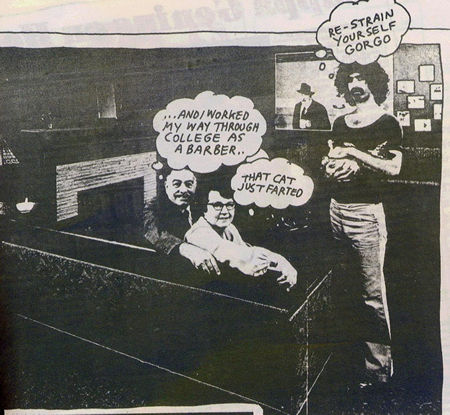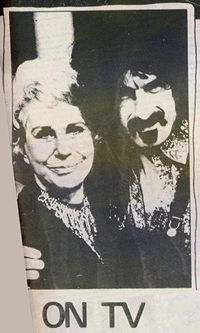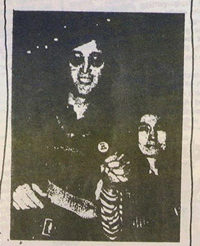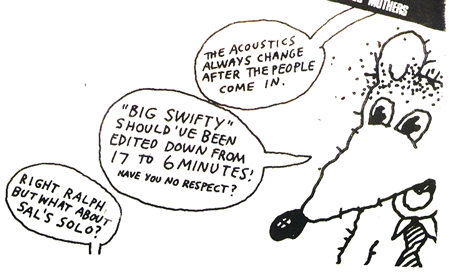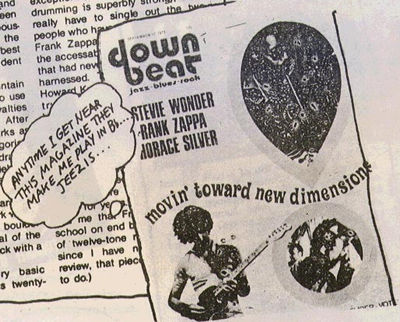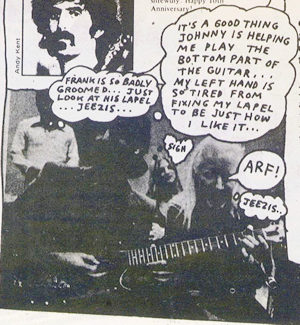OVERNIGHT SENSATION
The Mothers
Discreet (MS-2149)
by Noë Goldwasser
There he sits, perched atop his Olympian toadstool, dropping farts and thunderbolts into a tape recorder. Few have escaped his world unscathed by his grungy sensibility, fewer still have approached the level of his visionary complexity. With this album, Zappa seems to have come to terms with his peculiar position as the only guy smart enough to understand what he was doing. He has made a few trips down from his mountain, relaxing his Stravinskian hauteur long enough to mingle with the hordes who (in his own words) "wouldn't know good music if it came up and bit them on the ass."
Well, ass beats class, you know, and Frank was always the first to tell you that. He is the king of the avant bozos, the original hungry freak and the missing link between John Cage and Ooga Booga. And now, from the same lunatic fringe that brought you Alice Cooper, groupies, Rubin and the Jets and Zubin and the Mets, Suzie Creamcheese and The Duke of Prunes, we have a totally enjoyable album that's fun for the whole family—if you happen to live with a bunch of oversexed geeks.
Overnight Sensation is more than just another stanza in the life work of a mad genius. It is an earthy preface to a whole new volume. It is his most relaxed piece to date, though that doesn't mean Zappa's going in for any pedal steel cowboyisms. It's just that all those grunting, squealing and often shrill elements have been incorporated into a much more natural, yet essentially groiny delivery, Zappa's voice is less cynical, though still sarcastic; less a commentator on the action and more a funnel for his utopian vision of dildoes and enemas for everyone. It's as if he's finished having to proselytize and everybody's already been converted so there's nothing left to do but gird the loins, enter the breach and massage the musical clit.
The latest version of the Mothers is stripped for action. They're all smiling lasciviously on the album's inside cover—even Frank looks sincerely pleasant. Jean-Luc Ponty, the French jazz violinist is there, playing his ass off and so rapt in that he doesn't even seem to mind the glob of come some nut has drawn onto his shoulder. George Duke, the keyboardist holdover from Zappa's last grouping is there, as are old regulars Ruth and Ian Underwood, whose presence is appreciated for the tightness of the lp. Then there are the brothers Fowler, Tim and Bruce on bass and trombone respectively; Ralph Humphrey on drums (played quite melodically), and trumpeter Sal Marquez, who combines with Kin Vassy to become this incarnation's Flo & Eddie and spice up the lp's most salacious and mood-setting cut, "Dinah-Moe Humm."
Of course, the lp is a concept—what Zappa album has not been, and have you ever heard a single bit of news about the man that did not seem to be designed, a logically edited detail from a highly ordered and meticulously ingenious life-collage? Zappa's music is unclassifiable, a jazz instinct harnessed by the Varesian logic of a power-crazed madman who inhabits the seedy depths of youth culture because it's the only one that would accept him.
Having made his social comments on topics like plastic people, status at the high school, brain police and road ladies, Zappa returns to an elaborate celebration of the most pervasive element in his warped personality: the joys of a wet crotch. To put his point across, Zappa has laid out his arguments in a convincing order. Side one's foreplay opens with three short, rhythmic statements (two "love ballads" and an editorial comment on media fascism) and builds, with a six-minute, jazz-riffing bridge, to side two's heavier breathing: "Zombie Woof" invoking the God of Dirty Old Men, "Dinah-Moe Humm" the come-drenched climax, and "Montana" riding into the sunset.
This cerebral aspect—as seen through the lp's incredibly literary lyrics and the funky voicings of Zappa, Ricky Lancelotti, Kin Vassy and Sal Marquez, and sexy back-up vocals by some soulful Zappettes—is mixed into the lp along with a whole lot of really good jazz.
The production mix is superb, too. This is one of the few recent lp's that seems designed for earphone listening. Fowler's bass and Ralph Humphrey's drums ride the melody lines set by Duke, Underwood and Zappa, while Jean-Luc's violin and baritone violin prance all over the place, demonstrating Zappa's influence on this European virtuoso who first gained fame in higher-brow jazz circles (check out Violin Summit, on which Ponty faces off with Stefan Grapelli).
Zappa invokes his muse with "Camarillo Brillo," a raunchy paean to "a magic mama/And she could throw a mean Tarot":
She stripped away her rancid poncho
An' laid out naked by the door
We did it til we were unconcho
And it was useless anymore
and then the song closes out with the patented Zappa aside, "is that a real poncho . . . I mean is that a Mexican poncho or a Sears poncho? hmmm . . . no fooling!"
"Dirty Love," after the Message song "I'm the Slime," is a refreshing waft of tuna scent. It reitaretes the theme of grungy but urgent animal sexuality that has come to typify this no-bullshit stance. Step aside, Marvin Gaye. "I'll ignore your cheap aroma/ and your little bo peep diploma/ I'll just put you in a coma/ with some dirty love." It withdraws into fade-out (which Zappa uses often on this lp, still managing to make it seem apt), a chorus with some doowoppized nonsense about chewing poodles, a perfect seguè into that bridge number, "Fifty-Fifty."
Here the band really wails. Ricky Lancelotti has the lead vocal and it sounds like beefheart squeezed through a meatmincer, perfect substance for the tapefreak audio effects that follow. A roll on the tom-toms, the bass line jumps in and Duke moves out with airy organ chords. Then you hear what sounds like an electric guitar but ends up being Ponty stating the leitmotif and getting very lyrical. Zappa jumps in, running around the fingerboard with speed and nervous energy, and Lancelotti returns with "An' that's awright people, I'm just crazy enough to sing to you-ou-ou/ Any old way."
If they ever make a movie of this soundtrack, the love scene will never get past the censors. Maybe it's better that way—the scenario is much more graphic on vinyl, "Dinah-Moe Humm" is that love scene, as well as being the album's signal piece. It is the story of
a lady named Dinah-Moe Humm
She stroll on over say look here, bum
I got a forty dollar bill say you can't make me cum
(Y'jes can't do it)
What follows is a seemingly mysoginist work which, upon deeper inspection is just a funny, horny song behing which all the members of the band, male and female, get down. It is above (or below) feminist reproach; its comic tensions embody the textural psychosis of the supermusical vision, as it were.
"Dina-Moe Humm" is the raunchiest lecher ballad I've heard in a long time, with lines like
I whipped off her bloomers 'n stiffened my thumb
An applied rotation to her sugar plum
The soul chorus, too, is quite effective: "I got a spot that gets me hot (oooh) but you ain't been to it," I'll leave you with that thought. Get this record and find your spot.
Crawdaddy December 1973
